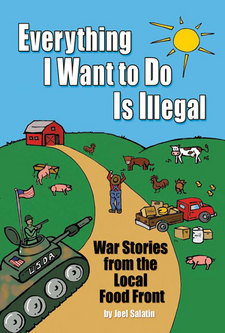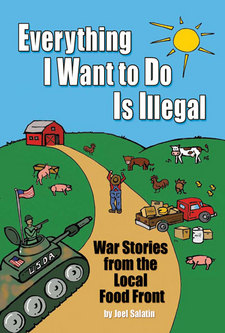This is part four of my discussion of Everything I Want to Do Is Illegal.  Read part one here.
Read part one here.
Chapter 13 relates the story of how Salatin’s county tried to make it illegal to use a sawmill on agricultural property. For a farmer with over 400 acres of woodlands this represented a problem. Salatin was the only person to speak against this proposed ordinance and managed to get the county to change the language so that farmers could mill their own wood on their own property. However, Salatin becomes a criminal whenever he uses his sawmill to saw up some wood for his friends as he likes to do on occasion. I am amazed at how utterly ridiculous these ordinances can be.
Chapter 14 goes into zoning laws. Salatin would like to offer schools the opportunity to come and tour his farm…for a price. He cannot do this though because zoning laws prevent it. An educational institution has no place on agricultural property. He cannot invite the kids to recreate on his property either because that would make his operation an amusement park. He could have 10,000 non paying visitors come every day without a problem but as soon as one of them pays him…it is illegal. Talk about bass ackwards.
Salatin does hold annual seminars for industry professionals and it is illegal. But what choice does he have? The public needs to be educated about this type of farming and land management or it will be gone with the wind.
Zoning also prevents him from processing his farm foods on his own property. Never mind that it just makes good sense to do it that way. And he can’t sell the goods that his neighbors produce. If he were to do this it would make him a Wal-Mart in the eyes of the law. He would be a criminal for selling some leftover pumpkins for the gal next door. Writing this book was in fact illegal because he wrote it on his farm in an agriculturally zoned area without a special permit. I for one applaud him for breaking the law!
Much of this ridiculous policy got started because of the NIMBY attitude that so many have today. NIMBY stands for Not in My Back Yard. All it takes is few complaints about this or that that and then there are laws laid down to prevent “problems”. People are willing to give up freedoms that they don’t personally care about for a little temporary peace of mind…until the government comes knocking on their door that is. It will all come back to bite you on your arrogant tushie. ;) When we impose our will on others there will inevitably be someone allowed to impose theirs on us.
Chapter 15 discusses labor and how it is illegal to hire teens to work on the farm and run any kind of equipment. Apparently they get requests all the time from young men and women to join the team as apprentices and they can’t really allow this because the second they let a 16 year old licensed driver operate a cordless drill or drive a four wheeler to collect eggs they are in violation of labor laws. Salatin also feels that kids get involved with drugs and immoral lifestyle because we have made it illegal for them work with child labor laws. I see his point…somewhat…but DO feel as though we need at least some regulation in that arena. If a 16 year old wants to work 50 hours a week on a farm I think he or she should be able to. BUT having no regulation in that area would also allow employers and parents to force work on kids. I have a family member that was forced by his father to work full time from the time he was 12. Yes, maybe it kept him out of trouble and it taught him a trade but he lost his childhood and he still seethes about it 40 years later. Abolishing child labor laws is not the answer. In this chapter Salatin also discusses how the minimum wage laws can tie the hands of employee and employer.
In Chapter 16 the subject at hand is housing and this chapter really infuriated me. Salatin tells the story of how his son decided to build a house on their farm…a 700 square foot bungalow that would be a good starter home that his parents could move into down the road when they wanted to downsize. The county told them that nothing less than a 900 square foot home was acceptable. The county also told him that his expensive composting toilet was a no go as well. He had to have a septic tank and because the septic tank had to be near a waterway (I swear I am not making this up) the whole location of the house had to be changed. It took more than 2 years and a lot of money to get that house built to what the county considered livable and for it to be eligible for home owners insurance. It is outrageous that you cannot elect to raise a yurt or a teepee on your property and run electric to it if you so choose. What freaking business does the government have telling any of us we MUST live a certain way in a certain type of house.
Also discussed is the subject of conservation easements which farmers are applying for and getting to protect their lands only to find that they have forfeited all rights to build on it and grow it. They can’t even build a green house without violating the law. This is just another way we get suckered into opening the door for beurocrats to control us. The last few paragraphs of this chapter were my favorite…where he talks about how we elect to go to war and protect the liberties of other people while many of our own people are being terrorized daily.
“It is domestic tyranny and terrorism, fully licensed and sanctioned by theUS government.”
Amen!
Chapter 17 discusses a subject I detest…insurance companies. It also discusses how small farmers get targeted for possible infiltration by bioterrorists. A tractor trailer full of food can sit around for hours at a truck stop while the driver catches some sleep but a small farmer who pops some kettle corn at home and transports it to a local farmer’s market a few miles away can be put out of business. Why? The kettle corn producer’s mini van could have been accosted by bioterrorists enroute so we can’t chance it. This is a true story.
Chapter 19 braves the subject of taxes. Salatin is hit hard for making economical and practical choices. Instead of buying loads of fertilizer that can be written off as expenses he builds a pond so that the green sludge can be used to fertilize his soil and the water can fertilize the pastures in times of drought. His solution saves him money and it is more environmentally responsible but he is heavily taxed when he does this because his pond is considered a land improvement in the eyes of the government.
Also, a farm that was bought by his parents in the 60s for $50,000 is now worth a million and when his mother dies the government wants to their $250,000 piece of the pie before they will allow him to keep it. Outrageous! Of course there is a solution to that little problem that I hope Salatin is aware of.



Pingback: The Political News You Need to Know » Illegal Discussion Part Four
Pingback: Illegal Discussion Part Four | time management
Pingback: Insurance » Illegal Discussion Part Four
Pingback: Illegal Discussion Part Four | home improvement
Um. I thought they ended the so-called “death tax” a few years ago.
He is probably referring to an Estate Tax.